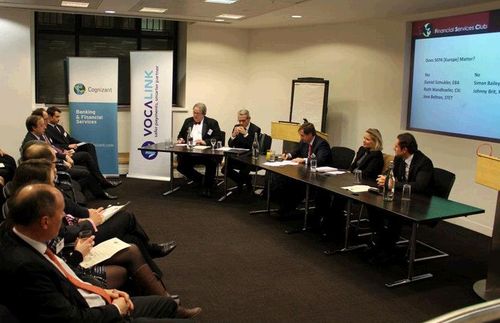
We had our annual pantomime debate at the Financial Services Club this week, with a classical Oxford style debate about whether SEPA, the Single Euro Payments Area, matters or not.
This year, with the backdrop of the Eurozone implosion, the debate was far livelier than usual, with a lot of spicy discussion about countries defaulting, the euro instability, the lack of political union and more.
In particular, the argument against the Eurozone was stronger than usual and so the pro-SEPA panel was loaded with three speakers:
- Daniel Szmukler, Head of Communications and Corporate Governance at EBA Clearing;
- Ruth Wandhofer, Head of Market Policy and Strategy, EMEA, Global Transaction Services, Citi; and
- Jose Beltran, Director of SEPA, STET.
On the other side was:
- Simon Bailey, Director, Logica
- Johnny Brit, former Chairman, Xenophobank
With the last person being a class act anti-euro plant.

It certainly stirred up the debate a bit.
The Case For SEPA
On the positive side, the panellists argued that SEPA is good for Europe, European Union, and European business and for European politicians. In fact, it’s even more critical today than it has ever been as the strains on the Eurozone would fall apart far more easily if SEPA and other aspects of the European Economic & Monetary Union (EMU), the Financial Services Acton Plan (FSAP) and the Directives that go with this were not so firmly established in place.
SEPA has been slow to progress, but it’s a ‘moving target’ and should be seen in context as a complex project that involves 9,000 banks and 27 countries (plus four if you include the Extended Economic Area of Norway, Iceland and Liechtenstein plus Switzerland).
This means that you need to understand that the political complexity in delivering a project like SEPA in banking is just a reflection of the political complexity of getting 27 nations to work together across the Union, and you can see how hard that is from things like the latest EU Treaty, the issues in Greece and the PIIGS and more.
In fact, progress was slowed because you had some countries blocking SEPA whilst others publicly supported the program whilst privately were trying to sabotage it, just as any political issue is dealt with.
The slow progress was also down to the fact that it was seen as a compliance project, which caused issues at the start as the program was given to lawyers rather than infrastructure operators.
This meant it was also seen as threat to banks rather than an opportunity.
Equally, it’s still unfinished and there’s still a lot of work to do, with goal posts changing as more requirements are added each month by regulators and governments, but important steps have been taken in terms of creating:
Good governance, through the European Payments Council (EPC) which took two years (2002-2004);
Good practices, through the development and implementation of the SEPA guidelines (2004-2008); and
Good delivery, by demonstrating that SEPA Credit Transfers are working, with almost a quarter of all credit transfers now in the SCT formats (2008 onwards).
Some countries such as Luxembourg and Cyprus now transact almost all their transfers in SCT format and even large countries, such as France, are seeing migration with 45 million SCT transfers per month today.
Yes, direct debits are more of an issue as everyone claims their direct debit structures are different, but that is also moving.
Eventually, it will be like SCTs with SEPA Direct Debits (SDDs) implemented across all member states.
And look at the benefits.
It now costs virtually nothing to withdraw euros at any Eurozone nation’s ATM network, when just a few years ago it could cost you up to €30 for a simple withdrawal.
And standards are making a difference in all of this. You cannot underestimate the impact of standardisation through XML for example, which is a foundation for innovation.
The end-dates will also help here, with February 2014 for the Eurozone states and February 2016 for the non-Eurozone nations.
You need to see the end-date as the ‘end of the legacy and start of the new’, which is when SEPA will really kick in.
So it’s going to happen … you just need to be with the programme, recognise it takes time and ‘give us a break’. After all, Rome wasn’t built in a day, and neither will Europe be.

The Case Against SEPA
The nay-sayers were more vocal, and in some ways backed up what the pro-Europeans were saying.
A key point was that SEPA and the Payment Services Directive (PSD) is no longer important against the backdrop of the Eurozone implosion.
Even if you took that implosion away, it would be less important as regulating the post-crisis world has taken over with things like Basel III, Tier 1 Capital ratios, liquidity risk, the rise of Remnimbi and transaction taxes moving to the top of the agenda.
All of this means that mundane activities like payments infrastructure harmonisation has moved down the table and, for some, completely off the agenda.
Equally, the supporters may say it takes time but it’s already ten years and what do we have? 22.66% of credit transfers in SCT format and just 0.93% of direct debits in SDD format. That is pathetic.
Then you say it will change with end-dates but what do the end-dates actually mean?
It’s just a political statement again, as there are no threats here.
Where are the sanctions if you don’t meet the end-date?
What’s the threat?
Where’s the punishment?
Is there any reward?
And the real issue is that no-one has mentioned the customer.
Who is bringing the customer along in this dialogue? The regulators? The governments? The banks?
No-one is dealing with the customer aspects or needs, and the benefits are risible rather than visible.
So the euro will be dead by the time we reach an end-date, and that means you can forget about SEPA and move on.
The evening then ended with many questions around the themes outline above and concluded with a vote on two questions:
- Does SEPA matter? and
- Is SEPA happening?
The 100-strong audience voted that yes, SEPA matters (65% in support – a stronger showing than in previous years) but it’s not happening (only one hand was raised to say SEPA was progressing well).

Obviously, there’s still a long way to go and, if you’re interested, two members of the audience also blogged about the evening: Ben Poole and Barry Kislingbury.
Thank you to them and to all, particularly our esteemed panellists.
A fun evening all around which, when you think we’re talking about SEPA, the PSD and the Eurozone, is saying something,
Postnote:
This is the third annual "Does SEPA Matter?" debate. Click on the links for the debates in 2011 and 2010.
Chris M Skinner
Chris Skinner is best known as an independent commentator on the financial markets through his blog, TheFinanser.com, as author of the bestselling book Digital Bank, and Chair of the European networking forum the Financial Services Club. He has been voted one of the most influential people in banking by The Financial Brand (as well as one of the best blogs), a FinTech Titan (Next Bank), one of the Fintech Leaders you need to follow (City AM, Deluxe and Jax Finance), as well as one of the Top 40 most influential people in financial technology by the Wall Street Journal's Financial News. To learn more click here...

